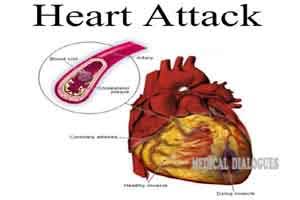- Home
- Editorial
- News
- Practice Guidelines
- Anesthesiology Guidelines
- Cancer Guidelines
- Cardiac Sciences Guidelines
- Critical Care Guidelines
- Dentistry Guidelines
- Dermatology Guidelines
- Diabetes and Endo Guidelines
- Diagnostics Guidelines
- ENT Guidelines
- Featured Practice Guidelines
- Gastroenterology Guidelines
- Geriatrics Guidelines
- Medicine Guidelines
- Nephrology Guidelines
- Neurosciences Guidelines
- Obs and Gynae Guidelines
- Ophthalmology Guidelines
- Orthopaedics Guidelines
- Paediatrics Guidelines
- Psychiatry Guidelines
- Pulmonology Guidelines
- Radiology Guidelines
- Surgery Guidelines
- Urology Guidelines
Regular exercise may cut depression post-heart attack

London: People who exercise regularly over several years were less than half as likely to become depressed after a heart attack than those who never exercised, finds a new study.
"Physical activity protects people from depression after a heart attack," said lead author Linda Ernstsen from Norwegian University of Science and Technology's department of nursing science.
Depression is three times more common among people who have experienced a heart attack compared to people who have never been afflicted by one.
After analysing a sample group of 189 individuals, the researchers were able to see how exercise habits over several years affected how people felt after a heart attack.
The study group that was characterised as physically active exercised a minimum of 150 minutes per week with moderate intensity or 75 minutes with high intensity, which is in accordance with the Norwegian guidelines.
According to results, people who had never exercised – over 17 per cent – were depressed after a heart attack. This was by far the most depressed group.
Participants who exercised consistently throughout fared best with only 7.5 per cent suffering from depression.
"The survey also provides reason for optimism. It helps if you have exercised and are in good shape from training earlier in life, even if you have since stopped. But it is apparently even better to have started exercising regularly in older age, even if you get off the couch late in life," the authors noted.
"It's never too late to start exercising," Ernstsen added.
"Physical activity protects people from depression after a heart attack," said lead author Linda Ernstsen from Norwegian University of Science and Technology's department of nursing science.
Depression is three times more common among people who have experienced a heart attack compared to people who have never been afflicted by one.
After analysing a sample group of 189 individuals, the researchers were able to see how exercise habits over several years affected how people felt after a heart attack.
The study group that was characterised as physically active exercised a minimum of 150 minutes per week with moderate intensity or 75 minutes with high intensity, which is in accordance with the Norwegian guidelines.
According to results, people who had never exercised – over 17 per cent – were depressed after a heart attack. This was by far the most depressed group.
Participants who exercised consistently throughout fared best with only 7.5 per cent suffering from depression.
"The survey also provides reason for optimism. It helps if you have exercised and are in good shape from training earlier in life, even if you have since stopped. But it is apparently even better to have started exercising regularly in older age, even if you get off the couch late in life," the authors noted.
"It's never too late to start exercising," Ernstsen added.
Cardiologyheart-attackLinda ErnstsenNorwegian guidelinesNorwegian University of Science and Technology's department
Source : IANSNext Story
NO DATA FOUND

Disclaimer: This site is primarily intended for healthcare professionals. Any content/information on this website does not replace the advice of medical and/or health professionals and should not be construed as medical/diagnostic advice/endorsement or prescription. Use of this site is subject to our terms of use, privacy policy, advertisement policy. © 2020 Minerva Medical Treatment Pvt Ltd